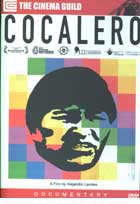
Cocalero 2007
Distributed by Cinema Guild, 115 West 30th Street, Suite 800, New York, NY 10001; 212-685-6242
Producer n/a
Directed by Alejandro Landes
DVD, color, 97 min.
College - Adult
Human Rights, Latin American Studies, Political Science, South American Studies
Date Entered: 12/05/2008
Reviewed by Charmaine Henriques, Northwestern University Library, Evanston, ILSince 1980, the United States government has directed its war on drugs against the lowlands of Cochabamba, Bolivia, a place known as El Chapare. The coca leaf farmers of El Chapare formed a union to stop coca eradication. Their leader is a 40 year old Aymara Indian Evo Morales. Evo Morales political career started during the dictatorship with a dreadful incident that took place in 1981. By his own admission he had very little education, no ideology, and always believed the President of Bolivia was the father of all Bolivians. However, the day he witnessed a Quechua Indian doused with gasoline and burned alive by government forces he began to question the government's motives; this put him in contact with the coca unions of the Tropics.
Cocalero is a documentary that follows the historic campaign of Movement Toward Socialism (MAS) candidate Evo Morales. Cameras follow Morales on his bid to become the first indigenous president of Bolivia and he is portrayed as a laidback all around good guy David, taking on the neo-liberalism capitalistic corrupt Goliath government, to protect the Cocaleros and more importantly indigenous rights. We witness him being confronted by racial epithets, his stirring speeches at rallies, his handling of loaded questions from the media, and his intimate interactions with the people he fights for and those who support him. Also, through interview with Morales' inner circle (such as Vice Presidential Candidate Alvaro Garcia Linera and Deputy Senatorial Candidate Leonilda Zurita) you get to watch and relive the birth, development, and mission of MAS and the coca leaf farmers' union.
This documentary is vividly shot and alarmingly refreshing in its casual presentation. As a film about a presidential campaign, Cocalero is quite appealing and shocking in its portrayal. Morales is followed in a voyeuristic manner which gives a spectator's view, as if one was in the back of the car going along for the ride. It is very clear that filmmakers had complete access to Morales and created no pretense as they exposed the best and the blemishes of his quest to become the president of Bolivia.